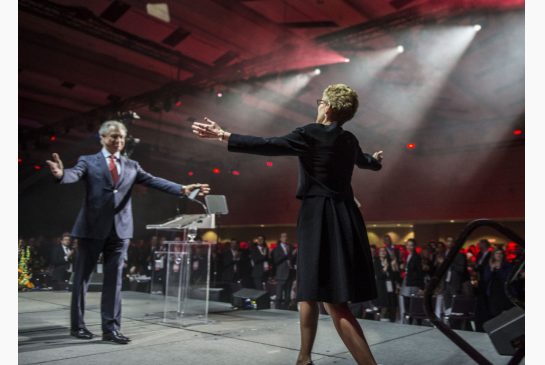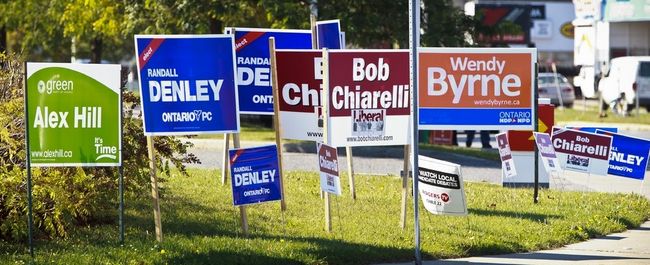 By Ray Rivers
By Ray Rivers
April 8, 2016
BURLINGTON, ON
Please don’t think that because I criticized Ontario’s Premier for holding special access fundraising events – that I’m responsible for her changing her mind on this delicate matter.

A live in between the politicians and the business interests.
We know that Premier Wynne had been thinking about this for some time. But I am pleased to see she is finally reacting: cancelling all ministerial fundraising events, phasing out corporate and union donations, limiting individual donations, and putting rules around third party advertising during elections.
The Premier has promised to consult with the other provincial leaders on these election finance reforms, so the ink is far from dry on the changes. But the Conservatives, under their new leader Mr. Brown, seem supportive of her proposed changes, though they are reluctant to give up their own fundraising events. And the NDP can hardly say no, though they must be a little concerned about losing their union financial support.
And to complete the picture, the Province has also announced changes to the way municipal elections are to be run. New rules will enable municipalities to use ranked ballots and to ban corporate and union contributions to municipal electoral campaigns, as the City of Toronto had done years ago. This enthusiasm for improving local democracy does, however, begs a question. If these changes are such a good idea, why not just mandate them rather than leaving it up to municipal councils to voluntarily implement?

Is the public ready for ranked ballot elections and will they press their councils in the municipalities to implement them?
Incumbents in municipal councils are typically the default winners at election time. So don’t expect them to be in a hurry to revamp a system that keeps them in power. Without political parties, many voters see local elections as a crap shoot, since they typically aren’t aware of what each candidates actually stands for – so vote for the incumbent. A ranked ballot may not change that, nor change the frequency of incumbent re-elections. But those who do get elected will have broader public support as a first, second or third choice.
And, if ranked ballots will enhance local democracy, why not implement ranked ballots for Ontario’s provincial elections as well? And why isn’t the Premier joining fellow Liberal Justin Trudeau in his search for an electoral process to better serve Canadians? Harmonizing Ontario’s electoral process with Canada’s can only make voters more comfortable with the voting process, and perhaps encourage more voters to come out on election day.
Jean Chretien has a place in Canada’s history books for at least two reasons. First, he kept Canada out of the disastrous invasion of Iraq. And second, he revolutionized federal election finance rules. Those rules were so well-founded that his arch foe, Mr. Harper, largely continued them, in fact strengthening the prohibition on corporate and union contributions. And we know Chretien got it right because even the Globe and Mail, in a recent editorial, has called on the provinces to adopt the federal election financing rules as their own.
Of course Mr. Harper couldn’t leave well enough alone. The very notion that government would actually fund the operation of political parties is anathema to neo-conservatives. So no sooner had he obtained his majority, than he ripped the heart out of Chretien’s package by killing public financing as a partial alternative to financing with private donations. And then he once again increased contribution limits. It didn’t matter that political deductions cost the government more in lost revenue than it would have to pay for the public financing alternative.

How many donations are paid in cash that is stuffed in large brown envelopes?
Not only is public financing a more equitable and efficient way of allowing political parties to continue to serve Canadians, it is the only way to effectively put a stop to the political gravy train. That is right, big donors give money because they believe that buys them influence, and if you’re not a big donor…?
The system will always be tilted in favour of those with fat cheques going to the party war chest which best reflects their needs, unless we put a stop to it. And as to fairness – as one reader noted, political contributions receive higher income tax deductibility than do charitable donations.
Even before the recent Liberal sponsorship scandal, politics in Quebec was often associated with corruption. Whether perception or reality, the provincial government has reacted to that issue by limiting annual political party donations to $100 – a model for the rest of the country I believe.

Rivers will be away for a few weeks travelling in the Ukraine doing research for his next novel. His first book, “The End of September” , is available on Amazin. Ray Rivers will return to his weekly column on both federal and provincial politics, applying his more than 25 years as a federal bureaucrat to his thinking. Rivers was a candidate for provincial office in Burlington where he ran as a Liberal against Cam Jackson in 1995, the year Mike Harris and the Common Sense Revolution swept the province. Rivers is no longer active with any political party.
Background links:
Corruption – Evils of Fundraising – End of Fundraising – Third Parties – Selling Access to Decision Makers –
Wynne Cancels Fundraisers – Political Financing in Canada – Quebec Contribtion Rules – Municipal Elections –
Ranked Ballots – How Ranked Works –




















Big money destroys democracy. Instead of every vote counting politicians think every dollar counts.
Get big money out of politics and watch a true government of the people, by the people, for people emerge from the dark ages of dollar democracy
Very interesting article, Ray.